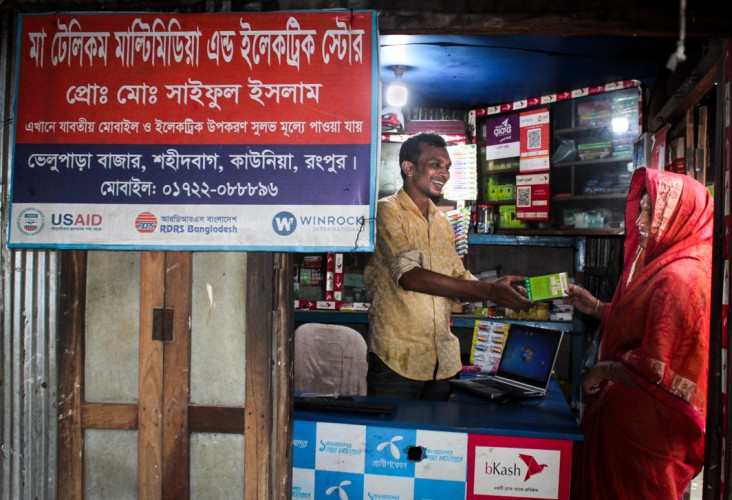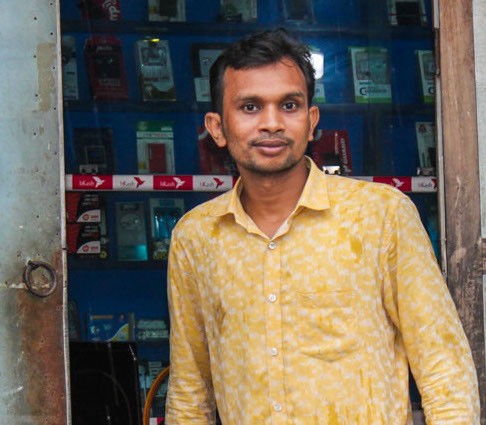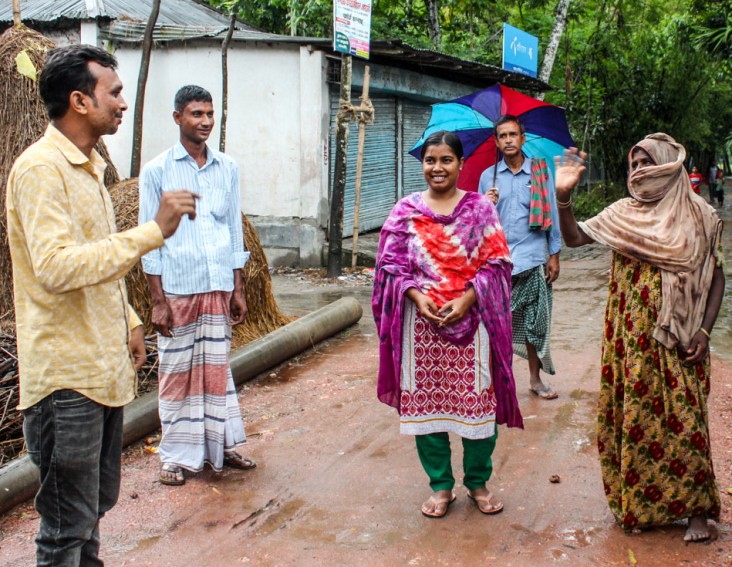Speeches Shim

Saiful Islam lost everything. Now he works to keep others safe in a time of crisis.
Sadly, for many, the allure of a good income and life abroad proves too good to be true. Yet, there can be hope, even when things do not pan out right away. Just ask Saiful Islam.
Saiful grew up as the youngest of seven children in a poor family in the northeastern Rangpur District. After completing higher secondary school and earning a bachelor’s degree in social sciences, he worked as an energy supervisor in the Rural Service Foundation Solar Company based in the Bogra District of Bangladesh. After his short-term contract ended, he wasn’t able to find another job. With no other options, he began farming a small plot of land inherited from his father. He quickly realized, however, he could not support his wife and daughter with income from his small farm, so Saiful then decided to look for work abroad.
Desperate, he contacted a local recruitment agency, and the director of a vocational training center found him an attractive position as an electrician in Singapore with a two-year contract and a monthly salary of $1,600. Saiful handed the recruiters BDT 565,000 ($7,000) for his airfare and fees, raised by selling most of his inherited land. Saiful arrived in Singapore on August 21, 2017, with a rough landing; the job was not what was advertised.

First, he would be working as a mason, not an electrician, and his salary would be less than half of what he had been promised. In the end, he got no pay or enough to eat, and his employer closely watched his every move. Worried about his well-being, Saiful’s wife started raising funds among family and friends, saving enough to buy his plane ticket back to Bangladesh. After almost a year abroad and even further from his dream of economic prosperity, Saiful returned to Bangladesh with his life, but nothing else. He had sold his land, lost his money, and still had no way to earn a living and support his wife and daughter.
Then he attended a trafficking-in-persons community-awareness event sponsored through the USAID/Bangladesh Counter Trafficking in Persons (BC/TIP) activity implemented by Winrock International, and organized by local partner Rangpur Dinajpur Rural Service (RDRS). After this event, Saiful met BC/TIP peer leader Beauty Khatun, community mobilizer Ashraful Islam, and project officer Md. Abdur Rahman, who explained the resources and support Saiful could receive to get his life back on track. Soon after these encouraging discussions, he signed up for a USAID-supported life-skills development course.
“I wish I had known about this program earlier,” Saiful said. “I would not have endangered my life in this trap and lost everything.” After connecting with BC/TIP, Saiful joined sessions on counseling, life skills, and entrepreneurship development. He also became a member of the survivor’s group, ANIRBAN—“The flame that never dies.”

The positive changes in Saiful were evident right away. In early 2019, Saiful started a small business, a market stall, where he sells hardware, electrical connectors and wires, and other consumable items, which brought in income to support his family. He aspired to do more for the community, however. In November 2019, he helped the district prepare for emergencies by putting together a database of more than 860 volunteers who had agreed to donate blood at local hospitals.
In addition to participating in routine activities of BC/TIP and ANIRBAN, Saiful visits victims and vulnerable individuals on his own. He speaks at community meetings and school orientations, telling audiences about human trafficking prevention and safe migration. Whenever he learns of cases of smuggling or illegal trafficking, he visits the victims and tries to connect them with the USAID BC/TIP activity. He speaks to children and their families about the risks of early marriage, how it interrupts education and is illegal in Bangladesh. In most cases, parents are convinced, and the children do not marry. If a family is faced with a crisis, Saiful helps put them in touch with the BC/TIP activity. Often, he visits victims’ homes to listen and discuss their problems face to face, commiserating as only someone who has been trafficked can.
In December 2019, aagins with USAID support, Saiful started a six-month course on cellphone servicing and repair at the Rangpur Engineering and Technical Training Centre. After this training, he expanded his small business, offering cell-phones and small-appliance repairs. He plans to increase his engagement for the most vulnerable people in his community, in particular, those who were trafficked and victims of early marriage.
During the COVID-19 outbreak, Saiful joined the BC/TIP activity and the local administration to make and distribute 200 masks and to identify 100 families needing relief. He is urging residents to stay home and maintain social distancing, so they remain safe. Leading by example, he continues to reach out to victims and their families by telephone.
Saiful has also used his own money to create a fund of BDT 15,000 (almost $200) to support 13 families in his locality the ANIRBAN network and peer leaders identified as most vulnerable during this pandemic. He hopes other volunteers will soon join this effort. He remembers how difficult it was when he returned home, and he doesn’t want others to go through a similar ordeal. “As long as I am alive,” he says, “I will try my best to help them.”
Since 2014, the USAID/Bangladesh Counter Trafficking-in-Persons activity has given more than 2,890 trafficking survivors a place to heal and start a new life. More than 25,260 migrants have learned about their rights, and almost 5,000 persons at risk of trafficking have been given the information they need to stay safe.

Comment
Make a general inquiry or suggest an improvement.